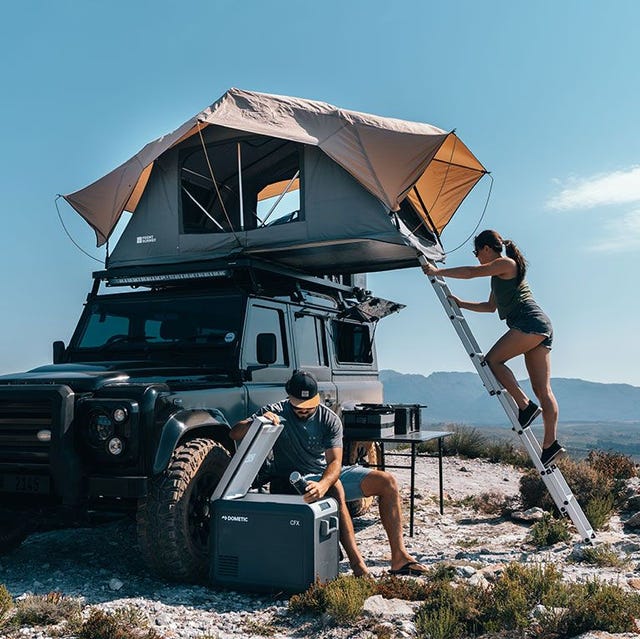Camping. American culture romanticized it long before it looked macho in John Wayne westerns. But bedding down on the ground and sleeping on a thin pad isn’t everyone’s cup of bucolic brew; it can be uncomfortable, and setup and breakdown is nearly always more time-consuming than expected.
Therefore, rooftop tents — boxes that live above the car and readily deploy to create a dwelling you clamber up into via a fold-out ladder — provide a more convenient solution for a lot of would-be, kinda-sorta semi-into-nature types (a.k.a. your significant other who’s not as into pine-scented goodness as you are).
Think of the best rooftop tents as relatively expensive gateway drugs to the outdoors. Sure, they’ll set you back four figures — but once purchased, you’ve got an instant AirBnB with you at all times. And it's cheaper and more convenient than buying a custom camper van or cool off-road trailer.
What to Watch for When Buying a Rooftop Tent
Aerodynamics: Fuel isn't cheap right now. Lower profile tents will be more costly, but they have less of an impact on fuel economy.
Ease of Installation and Setup: Tool-free is better than tool-intensive. You may need a friend or partner to help with the initial mounting. The point of a rooftop tent is to make camping quicker and easier. So you'll want a tent that sets up and folds back into place with ease.
Hardshell vs. Softshell: Hardshell tents tend to be the preferred option. They are more aerodynamic while driving, take less time to set up with parked, have better weatherproofing and tend to be less noisy. Softshell tents can fold out to provide more space and — depending on the height of your vehicle — provide some shaded area.
How easy are rooftop tents to remove? Lifting something that weighs more than 100 pounds onto a car roof can be difficult. You'll likely want a second person or some form of hoist system to remove the tent.
Is a rooftop tent an RV? A rooftop tent can be a grey area at certain campsites. RV campsites may have prohibitions on tent camping. Tent campsites may have prohibitions on keeping a vehicle at the campsite. The best bet is to consult local laws and regulations before traveling.
Size of the vehicle: You can use rooftop tents with different types of vehicles. But a shorter roofed compact car cannot spread the weight of a heavy, 100-plus shelter the way a longer SUV can.
Rooftop Tent vs. Ground Tent
Accessibility: Ground tents are more accessible. Rooftop tents tend to require a steep ladder for access. That can be problematic for older campers, campers with disabilities or those with a history of knee problems.
Comfort: Rooftop tents tend to be more comfortable. Typically a rooftop tent will have an integrated foam mattress. The mattress allows you to use standard bedding and pillows instead of a sleeping bag. Rooftop tents tend to stay drier and better ventilated. And they are less accessible to animals.
Portability: With a rooftop tent, you're limited to camping where you can park your vehicle. A ground tent gives you the option to hike and camp at another location. Or alternatively, leave your campsite setup while you move your vehicle to a different location.
Price: Ground tents tend to be dramatically less expensive than rooftop tents, which can run well north of a thousand dollars.
Safety: Rooftop tents can be safer than ground tents. You're less accessible to wild animals like bears when camping in remote areas. In well-populated areas, you're less likely to be run over by a car in the middle of the night. Alternatively, rooftop tents can be stolen from the top of the vehicle while ground tents can be stored safely inside.
Setup: Rooftop tents typically can be set up and folded back easily in a matter of minutes, taking far less time to set up than ground tents.
Warmth: Rooftop tents tend to be warmer than ground tents. Because they don't have to be carried, rooftop tents can be heavier with thicker, higher-quality materials and better insulation. And you're not camping directly on the cold ground in the winter.




0 Commentaires